FICTION.
THE MAN WHO LOST HIMSELF.•
THE industrious and ingenious Mr. Stacpoole has given us a new and entertaining set of variations on one of the oldest themes in fiction, the confusion wrought by a " double." The variations begin at the very beginning, for whereas the essence of this sort of imbroglio resides in the alternate appearances of the pair, here one of them is eliminated at the outset by his own rash act. For, " unable to resist the prompting of the extraordinary likeness, this joker, this waster, done to the world, had left life at the end of a last jamboree and with a. burst of laughter—leaving another man in his clothes, nay, almost one might say, in his body." The other man, Victor Jones, an Australian from Philadelphia, wakes up after his doping " to find himself in a stately home in Carlton House Terrace, surrounded with obsequious flunkeys. Victor Jones had been at the end of his tether and threatened with ruin when Lord Rochester intervened and committed suicide in his name and clothes, but all the same Jones succeeded to what was in many ways a danutosa haercditas, including, besides a dubious reputation, friends of the Mulberry Hawk type, moneylenders, blackmailers male and female ; also incidentally a beautiful and forgiving wife. There are some big fences to be taken by the reader—notably the acquiescence of relatives, friends, and servants in Jones's strange American lingo and other deviations from the habits of the defunct Rochester. The reasons why Jones accepted the situation are more plausibly explained, and impossible stories are not written for the sceptical and incredulous. How this serious- minded and honest young man reconciles' himself for a while to the assumption of a position so strangely thrust upon him; how he " chucked out " evil associates and confounded money- lenders and blackmailers ; how in a fit of chivalrous conscientious. ness he revealed his true identity to Lady Rochester and other members of the family, only to be locked up in a lunatic asylum for his pains ; how he escaped, after adventures recalling those of Alfred Hardie in Hard Cash, redeemed his double's past by appro- priating his name and shedding lustre on it in the House of Lords, and fully regularized his position by remarrying Lady Rochester privately—all this is told in Mr. Stacpoole's vigorous manner with a profusion of incident, humour, and sentiment. On the whole, we prefer him in the tropics and not as here in Mayfair. Lady Rochester is a perfect idiot, though apparently Mr. Stacpoole does not think so, and the other patricians are caricatures rather than portraits.


























 Previous page
Previous page